If you have suspected that mosquitoes target some people more than others, you are right – and hopefully you aren’t the one getting the extra bites. Turns out that 20% of the population is significantly more attractive to mosquitoes. Understanding why mosquitoes are attracted to certain people is of significant importance from a global public health perspective given that mosquitoes carry numerous diseases, including malaria, dengue fever, Zika virus, West Nile virus, and more. Knowing what is behind the attraction can help in developing more targeted and effective strategies for disease prevention and ultimately save lives. Here’s what the latest research is telling us.
Mosquitoes have long been suspected of favouring certain people over others due to a combination of factors, including:
- Body Odour: Mosquitoes are attracted to the scent of human skin and sweat. People release a variety of chemicals through their skin, and some of these compounds can attract mosquitoes.
- Carbon Dioxide (CO2): Mosquitoes are highly sensitive to CO2, which is produced when humans exhale. They can detect elevated levels of CO2 from a distance, which helps them locate potential hosts. Individuals who produce more CO2, such as larger people or those engaged in physical activity, may be more attractive to mosquitoes.
- Skin Temperature: Mosquitoes may be drawn to individuals with slightly higher skin temperatures. Pregnant women, for example, tend to have slightly elevated skin temperatures, making them more attractive to mosquitoes.
However, the latest research zeroes in on body odour as the deciding factor. According to recent research, the unique scent profile of each human being is composed of chemical compounds, and the mosquitoes seem to favour a human scent created by skin that produces a high level of carboxylic acids. Changes in a person’s diet or grooming habits did not lessen the mosquito attraction.
Produced in the oily skin layer called sebum, carboxylic acids are organic compound that humans in general produce in higher levels than animals; amongst humans, some people produce more than others. Although there is no home test for determining a person’s level of carboxylic acid production, the research shows that the level stays constant for each person. Chances are you already know if you are a mosquito magnet or not.
The question of why mosquitoes are attracted to the smell of carboxylic acids in the first place is also a bit of a puzzle, although one researcher thinks it might be because mosquitoes began to prey on human beings in part because humans often live near sources of clean water, where mosquitoes breed; over time, the insects developed a heightened sense for the smell of humans versus other animals.

For now, the hope is that the research will enable scientists to develop more effective mosquito repellents in the future. For example, one team is working on a repellent that will last several months once applied; another team is working on the genome-engineering of mosquitoes to discover how the mosquito neurons respond to human scent. More personalised approaches to repelling mosquitoes would also mean there might be reduced need for pesticides, which can harm the environment. As global health consultants, we applaud these research efforts for the end result of one day minimising the spread of malaria worldwide, particularly in areas of Africa that currently suffer the most from this disease.
DISCLAIMER:
Please note, all content provided is for informational purposes, and is believed to be accurate and current at the time of posting. It should not, at any time, be used in place of appropriate professional or expert advice.



